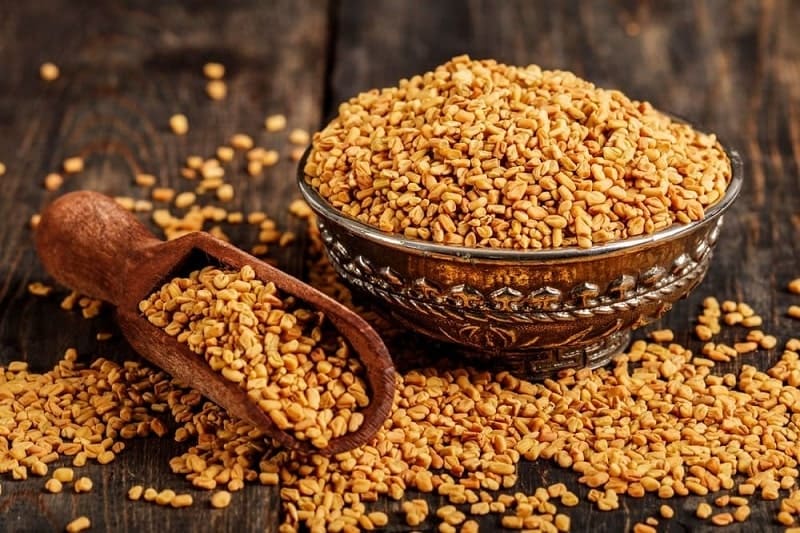
Fenugreek seeds in Urdu are known as Methi and are written in Urdu language as میتھی دانہ. Its tiny, golden-brown seeds that come from the Trigonella foenum-graecum plant. It is native to South Asia and the Mediterranean region.
Fenugreek seeds gained popularity due to their nutritional value and health benefits. These seeds have been used for centuries in traditional medicine and cooking. These seeds have a slightly bitter taste with a hint of sweetness, adding a unique flavor profile to dishes.
In this blog post, we will explore the nutritional content, health benefits, use, side effects, and precautions of Fenugreek seeds in Urdu.
Nutritional Content of Fenugreek Seeds
Fenugreek seeds are rich in nutrients such as protein, fiber, iron, magnesium, manganese, and vitamins B6 and C. They are also a rich source of antioxidants and phytonutrients, which contribute to their numerous health benefits.
Health Benefits of Fenugreek Seeds
Fenugreek seeds have a lot of health benefits due to their nutritional content. Below are several benefits of Fenugreek seeds in Urdu and English that contribute to their exceptional healthiness:
1. Diabetes Management
Fenugreek seeds are known for their ability to lower blood sugar levels. They contain soluble fiber, which slows down the absorption of sugar and improves insulin sensitivity, making them beneficial for individuals with diabetes.
2. Digestive Health
The fiber content in fenugreek seeds promotes digestive health by preventing constipation and aiding in regular bowel movements. They also have anti-inflammatory properties that soothe digestive issues.
3. Heart Health
including fenugreek seeds in your diet may lower cholesterol levels and reduce the risk of heart disease. The presence of antioxidants and fiber contributes to a healthy heart.
4. Breastfeeding Support
In traditional medicine, fenugreek seeds are often recommended to promote lactation in breastfeeding mothers. These seeds can stimulate milk production and improve milk flow.
5. Weight Management
The fiber content in fenugreek seeds can promote a feeling of fullness, which may aid in weight management by reducing overall calorie intake. Additionally, the seeds can help regulate blood sugar levels, which is important for weight control.
6. Anti-Inflammatory Properties
Fenugreek seeds contain anti-inflammatory compounds that can help reduce inflammation in the body. This makes them potentially beneficial for conditions such as arthritis, asthma, and other inflammatory disorders.
7. Skin and Hair Benefits
Fenugreek seeds are rich in vitamins and minerals that are beneficial for skin and hair health. They can be used topically as a paste or added to hair care products to promote hair growth, reduce dandruff, and improve skin complexion.
How to Use Fenugreek Seeds?
Fenugreek seeds can be consumed in various ways.
- Sprouting: Soak fenugreek seeds overnight, drain the water, and allow them to sprout. Add these sprouts to salads or sandwiches for a nutritious boost.
- Tea: Steep fenugreek seeds in hot water to make a herbal tea that can aid digestion and promote overall well-being.
- Powder: Grind fenugreek seeds into a fine powder and use it as a spice in various dishes or mix it with water or yogurt for a health-boosting drink.
- Cooking: Add whole fenugreek seeds to curries, stews, and soups to enhance their flavor and nutritional value.
Side Effects and Precautions
While fenugreek seeds offer numerous health benefits, it’s essential to use them in moderation. Excessive consumption may lead to digestive issues or other side effects. It’s advisable to consult a healthcare professional before using fenugreek seeds, especially during pregnancy or if you have existing medical conditions.
In conclusion, fenugreek seeds are versatile and nutritious seeds that can enhance both the taste and health benefits of your meals. Incorporating these seeds into your diet may contribute to better digestion, blood sugar regulation, heart health, and overall well-being.
FAQs About Fenugreek Seeds
Are fenugreek seeds safe for pregnant women?
While fenugreek seeds are generally safe, pregnant women should consult their doctor before using them to avoid any potential risks.
What is the recommended daily intake of fenugreek seeds?
There is no standard recommendation. Start with small amounts and monitor your body’s response.

Muhammad Parvaiz is a distinguished botanist and verified Google Scholar researcher with expertise in plant sciences. His impactful research contributions and commitment to academic excellence make him a valuable asset to the Hospital Hub team.

